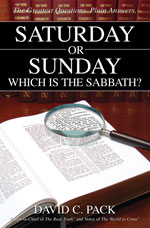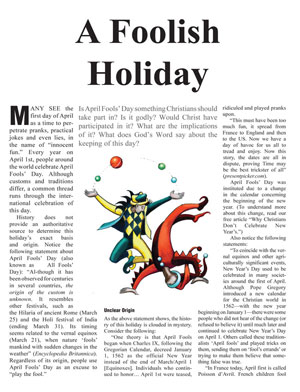Read what the Encyclopedia Britannica says about April Fools’ Day (also known as All Fools’ Day): “Although it has been observed for centuries in several countries, the origin of the custom is unknown. It resembles other festivals, such as the Hilaria of ancient Rome (March 25) and the Holi festival of India (ending March 31). Its timing seems related to the vernal equinox (March 21), when nature ‘fools’ mankind with sudden changes in the weather.” On April Fools’ Day people are given an excuse to “play the fool.”
April Fools’ Day is rooted in the ancient pagan customs of this world. It is literally a day for fools!
But God is the Author of wisdom, not foolishness. He expects His servants to seek His wisdom (Jms. 1:5), not play the fool.
In Proverbs 24:9, God’s Word says, “The thought [devising] of foolishness is sin.” And sin is the breaking of God’s spiritual laws (I John 3:4; Rom. 7:14). God condemns even foolish talking and jesting (Eph. 5:1-4). Christ stated, “…whosoever shall say, You fool, shall be in danger of hell fire” (Matt. 5:22).
Christ also condemned engaging in foolishness: “For from within, out of the heart of men, proceed evil thoughts, adulteries, fornications, murders, thefts, covetousness, wickedness, deceit, lasciviousness, an evil eye, blasphemy, pride, foolishness: All these evil things come from within and defile the man” (Mark 7:21-23).
Also, God commands His people to “Learn not the way of the heathen…For the customs of the people are vain [futile]” (Jer. 10:2-3). He also commands, “Wherefore come out from among them, and be you separate” (II Cor. 6:17).
Foolishness is sin. Christians must not engage in it. They must separate themselves from the pagan customs, practices and traditions of this world—including April Fools’ Day.



















